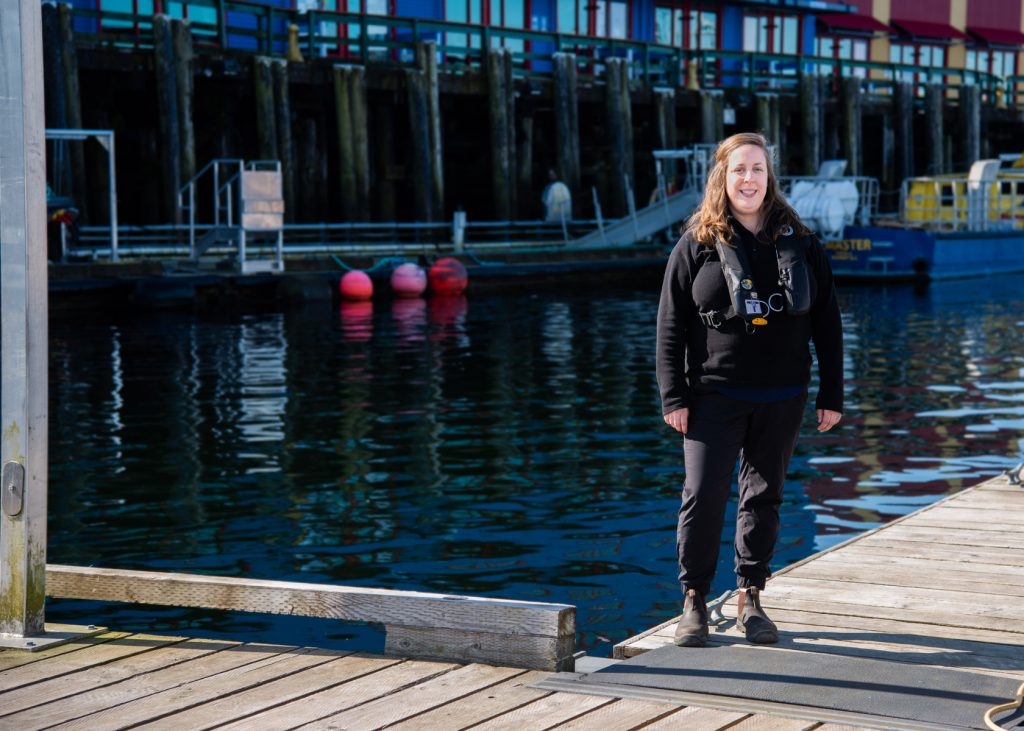Invasive species: Robust monitoring essential to detection, prevention
The Port Authority’s Environmental Technician collaborates to protect marine life

Content powered by:

May. 10, 2021 6:00 a.m. | IMPRESS
The ongoing mission to preserve aquatic life in Northern BC’s marine environment is a huge group effort, and one of the people at its heart is biologist Caitlin Smith. As the Prince Rupert Port Authority’s Environmental Technician, she contributes in many ways to preserving the North Coast’s marine habitats, especially when it comes to monitoring for invasive species.
Each year, the Port participates in the Aquatic Invasive Species Program. A major component is the Settlement Plate Program, which monitors for invasive tunicates and bryozoans. From June through September, Smith helps deploy dozens of plates at marinas around Prince Rupert, Port Edward, Metlakatla and Lax Kw’alaams. These simple devices consist of a clean, flat PVC disc secured to a brick to keep it weighted one metre underwater, where the target species can be found. The plates are suspended from docks where free-floating invertebrates will settle. At the end of the three months, they are brought to the surface and analysed for potential invasive species.
Another element of the Aquatic Invasive Species Program involves monitoring for European Green Crab, and there is work underway to set-up an extensive monitoring program in the North Coast. Smith helps monitor for the presence of European Green Crab larvae, by collecting zooplankton samples from locations around the region each season.
“Monitoring of aquatic invasive species is important to protecting the North Coast because it enables scientists to detect the presence of harmful invasive species before they begin to have ecological and economic impacts,” Smith says. “Mitigating or eradicating aquatic invasive species is incredibly difficult and is why early detection is key to help prevent their spread and contain the species.”
Collaboration is key in environmental monitoring efforts
The North Coast of B.C. has not had major issues with aquatic invasive organisms to date, but some aquatic invasive species are present on the central and south coasts, Haida Gwaii, and southeast Alaska. The Aquatic Invasive Species Program aims to keep the North Coast a step ahead of the threat. The Prince Rupert Port Authority collaborates with multiple agencies and groups, including Fisheries and Oceans Canada, Coast Mountain College’s Applied Coastal Ecology program and local First Nations to keep the region’s abundant marine life and their habitats under close watch.
“Collaboration is essential in establishing more robust monitoring programs that allow for the greatest amount of resources to be used. Without collaboration, our many environmental monitoring programs at the Port of Prince Rupert would not be what they are today.”
Learn more about the Port of Prince Rupert’s environmental stewardship and efforts to protect marine life at rupertport.com/sustainability
See more news

PRPA Provides $241,186 to Prince Rupert Regional Hospital through Rampage Fights Cancer Campaign
The Prince Rupert Port Authority (PRPA), Rupert Rampage hockey team, and North Coast Health Improvement Society have partnered to purchase several pieces of essential equipment for Prince Rupert Regional Hospital. Read More
Port of Prince Rupert Cargo Volumes Grew to 26.3 Million Tonnes in 2025 Alongside Substantial Development
The Prince Rupert Port Authority (PRPA) announced today that the Port of Prince Rupert handled 26.3 million tonnes of cargo in 2025, a 14 percent increase over 2024, during a historic period of infrastructure investment and development. Read More